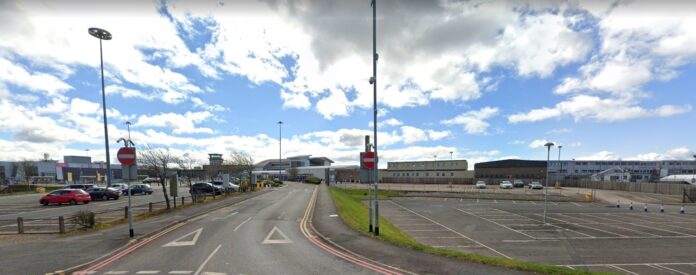By David Spereall, local democracy reporter
Leeds Bradford Airport (LBA) has been accused of breaching its summer season night flight quota for the second consecutive year.
The airport surpassed its 2,920 flight limit for the British Summer Time (BST) period on Thursday, the campaign group Group for Action on Leeds Bradford (GALBA) Airport claimed.
LBA has denied this, saying under its interpretation of planning conditions it has not exceeded the limit.
The airport apologised back in June after a lengthy investigation by Leeds City Council found it had run 747 too many night-time flights between March and October in 2022.
That led to the local authority issuing a breach of condition notice, effectively serving a warning of further punishment should the offence be repeat.
GALBA, which has fought previous plans to expand the airport on noise disturbance and environmental grounds, said it now expected the council to prosecute LBA.
The group’s chair, Chris Foren, said: “In June, Vincent Hodder, the airport’s boss, said ‘we have put in place all the controls and reports necessary to make sure these errors will never happen again.’
“Well, these ‘errors’ have happened again. It shows that you just can’t trust LBA.
“The council has already warned the airport that a failure to comply with the breach of condition notice is a criminal offence that is liable to prosecution through the courts.”
The news comes against a backdrop of heightened tension between GALBA and the airport in recent weeks, as LBA has applied for a series of certificates of lawful development through the planning system.
The airport says this is to seek clarity over the night-flight rules and to determine whether or not certain types of aircraft count towards the quota or not.
Campaigners and local councillors claim if the certificates are approved this could lead to “unlimited” night-time flying, a suggestion LBA has strongly denied.
Responding to GALBA’s claims the night flights quota has been breached this summer, Mr Hodder, who is the airport’s CEO, said: “We are currently following a process to clarify the correct interpretation of planning conditions governing night time flights at LBA with Leeds City Council.
“This is exactly why LBA has submitted Certificates of Lawfulness for Existing Use or Development to the Council, to establish what is lawful.
“From our interpretation of the planning conditions, which are nearly 30 years old, we expect that flights subject to night restrictions this summer will total less than 2,920.”
A spokesperson for Leeds City Council said: “The council’s monitoring of Leeds Bradford Airport’s night-time flight numbers for the 2023 summer season is an ongoing process that will continue until the end of British Summer Time in late October.
Airport boss hits back in night flights row
The boss of Leeds Bradford Airport (LBA) has hit back at critics in an escalating row over night flights.
Vincent Hodder repeated strong denials that the airport wants to run unlimited night-time flights, as claimed by campaigners and local councillors.
LBA applied to Leeds City Council for a series of certificates of lawful development (CLEUD) earlier this month, which it says is an effort to “clarify” the rules around whether or not supposedly quieter aircraft can fly to and from the site at night.
Group for Action on Leeds Bradford Airport (GALBA), which reported the site for breaching its night flight quota last summer, maintains there would potentially be “unlimited” activity at the site at night if the certificates are granted.
But in an open letter and self-penned Q&A document circulated to the media on Wednesday, Mr Hodder described such suggestions as “misleading”.
However, he admitted that certain types of aircraft would not count towards the quota if the airport’s “interpretation” of planning rules is correct and the certificates are granted.
In his letter, he said: “Some of the statements we have seen suggest that the granting of these CLEUD applications would lead to a huge increase in the number of night flights. This is absolutely not the case.
“Contrary to speculation, LBA is not seeking to change the planning conditions that apply to the airport.
“The CLEUD applications will provide a determination and clarify how the existing planning permission, written nearly 30 years ago, should operate.
“This will allow LBA to ensure that it remains compliant with the conditions in a complicated and changing landscape.”
But in a separate part of the document, Mr Hodder admitted “it is true” that aircraft with a specific noise threshold of quota count 1 (QC1) “would not be subject to night movement restrictions” if the airport’s “intepretation of the planning conditions is correct”.
He said such planes had been departing the airport “in an unrestricted manner since before 2007”.
But he added: “This does not mean that the airport would then seek to attract more QC1 rated aircraft and push them to operate during the night period.
“At most there have been 17 annual movements of QC1 aircraft in recent years, and as aircraft technology has evolved, there are increasingly fewer of these aircraft in use.”
Mr Hodder insisted the limit LBA admitted breaching last year “will continue to be in force regardless of the outcome of the CLEUD processes”.
But he added: “However, there are important clarifications required about how particular activities and aircraft are treated under those conditions so that LBA can have certainty that it is complying with the conditions.”
Critics have also attacked LBA for applying for the certificates, rather than applying for a change to its planning conditions.
The latter process would allow members of the public to comment and object, but the former does not.
But Mr Hodder said: “LBA has not chosen the CLEUD process in order to avoid public comment via some ‘more democratic’ process.
“The CLEUD process is simply the legal route prescribed to clarify lawful use under an existing planning permission.”

